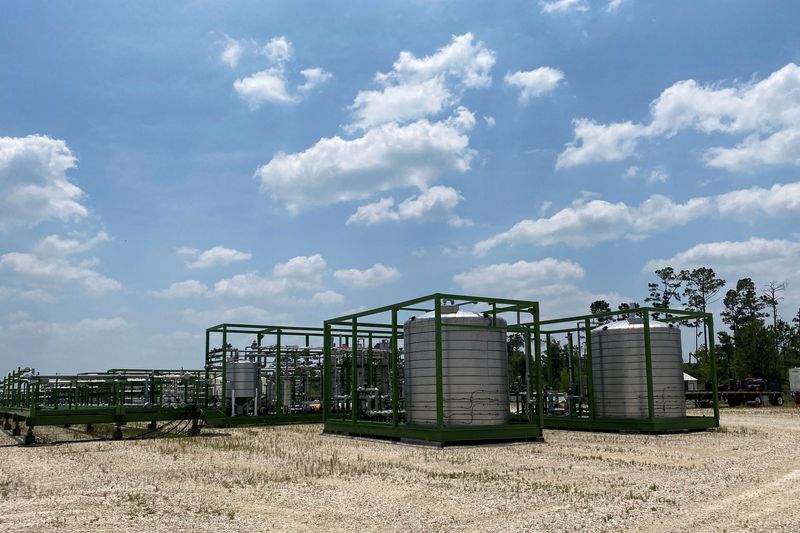By Ernest Scheyder
HOUSTON (Reuters) - In a milestone for the global clean-energy transition, International Battery Metals has become the first company to commercially produce lithium with a novel type of filtration technology, a step expected to usher in cheaper and faster supplies of the electric-vehicle battery metal.
At a site in rural Utah controlled by privately-held US Magnesium, IBAT started producing this week commercial volumes of lithium at a rate of nearly 5,000 metric tons per year using its version of a direct lithium extraction (DLE) technology.
The breakthrough has not been previously reported.
The company, which developed its DLE plant to be portable, has essentially beaten Standard Lithium, SLB, Rio Tinto (NYSE:RIO), Eramet and others to be first to that mark. Industry investors, analysts and customers have waited years for commercial level output.
With DLE now proven on a commercial scale, it is expected to grow within a decade into an industry with $10 billion in annual revenue by transforming the speed and efficiency of lithium production for EV manufacturers and others, analysts said, much the way that fracking and horizontal drilling helped boost U.S. oil production.
IBAT's method is based in part on technology developed by IBAT's chairman, John Burba, at Dow Chemical in the 1980s. "This is all about boosting the global supply of lithium," said Burba. "We feel like we've hit at a critical time for this industry."
The U.S. Geological Survey estimates that salty brine deposits across Europe, Asia, North America and elsewhere are filled with roughly 70% of the world's reserves of the ultralight metal.
Lithium has historically been produced with evaporation ponds, which are used to extract the metal from those brines, or open-pit mines, which are used to remove it from hard rock deposits. The intensive water use and physical footprint of those methods, as well as their long development and production times, sparked the hunt for a third option.
While DLE technologies vary, they are comparable to common household water softeners and aim to extract about 90% or more of the lithium from brines, compared to about 50% using ponds.
Arcadium Lithium and some others use DLE processes in tandem with ponds, but no DLE technology had previously reached commercial production without them, sparking competition to expand output to the many parts of the world where occasional rainfall makes evaporation ponds impractical.
Many brine deposits have varied chemical compositions, meaning it is unlikely that any single DLE technology - including IBAT's - will emerge as a global standard, analysts have said. Many Chinese deposits have high concentrations of magnesium, for example, and Bolivian deposits - among the largest in the world - have high potassium levels.
Lithium has repeatedly proven difficult to separate from those and other metals often co-mingled with it in brines. That has confounded many scientists working on DLE technologies for years. Lithium is also technically a salt, and can prove corrosive.
The breakthrough for IBAT coincides with a more than 80% drop in lithium prices in the past year, fuelling layoffs at industry leader Albemarle (NYSE:ALB), DLE upstart Lake Resources and others. Still, IBAT plans to build more of its plants and market them for use across the globe.
STRATEGY
IBAT said the company succeeded with hitting commercial-scale production partly due to its relatively small plants.
While rivals have tried for more than a decade to commercialize DLE, their plans involved production volumes of 20,000 tons per year or more at permanent facilities often in remote regions where labor and supplies are difficult to procure.
Houston-based IBAT designed and built a 450-foot-long (137 meter) portable plant in Louisiana that it moved in 13 parts to the US Magnesium site, which draws brine from the Great Salt Lake.
Additional plants can be added and stacked like Lego bricks to boost production in 5,000-ton-per-year increments. It takes 18 months to build an IBAT plant and reach production, the company said.
Each plant, which is smaller than three acres (1.2 hectares), is designed to move in the future to a new deposit for reuse, saving construction costs. IBAT's plant costs $50 million to $60 million each, depending on several factors.
Paris-based Eramet spent nearly $900 million on its own DLE project that aims to come online this year in Argentina after more than a decade of development.
Ron Thayer, president of US Magnesium, said he chose IBAT's process because of its portability as well as the type of adsorption material that IBAT's process uses to filter lithium from brine, which Burba developed.
US Magnesium, which has started selling lithium produced with IBAT's technology and paying IBAT a royalty, considered several rival processes including one from Breakthrough Energy Ventures-backed Lilac Solutions before settling on IBAT, he added.
"I consider (IBAT) a commercial lithium producer," Thayer said
Exxon Mobil (NYSE:XOM), which is developing a lithium project in Arkansas, has considered using IBAT's technology, Reuters has reported.

IBAT's facility aims to recycle more than 98% of the water it uses. Burba has repeatedly flagged the lithium industry's high water use as a structural impediment to DLE commercialization.
That recyclability is key especially in Utah, where officials last year tightened regulations on water extraction from the Great Salt Lake that forced Compass Minerals to abandon its lithium plans.